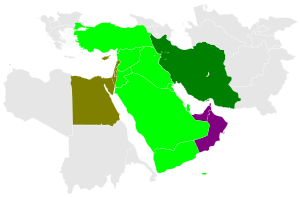
Summary
Israel Standard Time (IST) (Hebrew: שעון ישראל Sha'on Yisra'el, lit. "Clock of Israel") is the standard time zone in Israel. It is two hours ahead of UTC (UTC+02:00).

▉▉▉▉ Standard time observed all year
▉ Daylight saving time observed

| yellow | Israel Standard Time (UTC+2) Israel Summer Time (UTC+3) |
Overview edit
History edit
At the beginning of the British Mandate, the time zone of the mandate area (present-day Israel and Jordan), was set to Cairo's time zone, which is two hours ahead of Greenwich Mean Time. The unique "Israel Standard Time" came into effect with the founding of the State of Israel in 1948, which gave Israel the authority in determining its own time, specifically to enact daylight saving time.
Differences between other countries edit
The offset from UTC is equivalent to Eastern European Time (UTC+02:00), during most of the year. Because Israel switches to summer time on Friday, rather than Sunday as most other countries do, the change of time in spring occurs two days before the switch to summer time in Europe. The switch on Friday is due to having the Jewish Sabbath as the common rest day of the week. Prior to 2013, Israel Daylight Time ended earlier in autumn, and the time was identical to Central European Summer Time for between two and seven weeks during these months.
Israel also shares the UTC+02:00 time offset with Egypt, Lebanon, and Cyprus.
Daylight saving time edit
Israel observes daylight saving time, locally called Israel Summer Time (Hebrew: שעון קיץ She'on Kayits, sometimes abbreviated in English as IDT).
Since July 2013, IDT begins on the Friday before the last Sunday of March, and ends on the last Sunday of October.[1]
See also edit
References edit
- ^ Knesset votes to extend Daylight Saving Time (07/08/2013).


